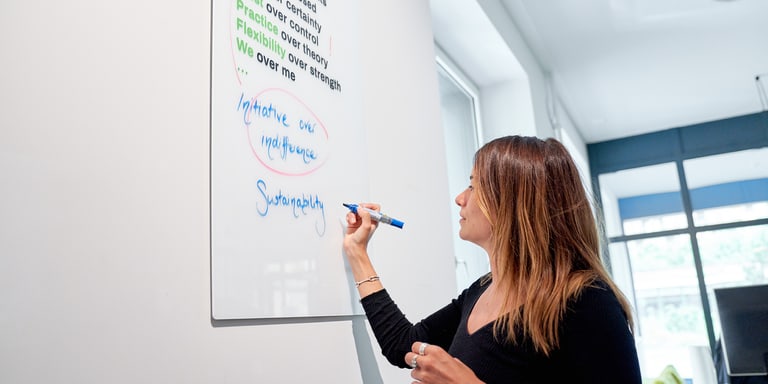The topic of climate change is often viewed from the perspective of individual and political activities. However, companies have a role to play, whatever their sector or size – so it is appropriate that our annual conference was devoted to sustainability and courage. The key aim of this year’s conference was to provide a level of shared information about environmental issues, and to inspire us all to act. No more, no less! To achieve this, we invited external speakers as part of our programme, the remainder of which was provided by Liipers.
Environmental experts to tackle the scale of the problem
Professor Andreas Fischlin of EPFZ, a member of the intergovernmental Panel on Climate Change (IPCC), granted us the honour of a keynote speech about the climate emergency. It is no secret that we are in a crisis. Over the course of around forty minutes, he talked about climatology and a comprehensive overview of the current and future effects of global warming. This was not a particularly cheerful subject, but there was a note of optimism. There are solutions, but we have to act quickly, very quickly... The trained biologist and computer scientist also highlighted digital world's role. We must avoid excessive energy consumption associated with the internet, develop a sustainable web and use green energy for our servers. Another area where the digital world can contribute is digital solutions promoting the energy transition. We are already working in this area but would like to do more.
We also considered the energy transition together with David Moreau, of negaWatt. This think tank created in 2002, and later becoming an association with 1200 members, has been active in Switzerland since 2018. negaWatt is seeking to play a role in the energy debate by developing and promoting measures based on sufficiency, efficiency and renewability. This is based on behaviour and measures scenarios relating to energy. The negaWatt scenario reduces CO₂, is nuclear-free and decreases imports. The digital world also has a role to play, and David had a few ideas to offer, like a platform to help people swap houses. We have too many unnecessary new buildings, and numerous people occupying homes that are too big or too far from their place of work. Another idea was an app for travel without a plane or car, as easy to use as booking a flight. This all provided sources of inspiration for us as developers and designers.
Global warming is already leaving its mark, notably on mountains and glaciers. This was noted by American snowboarder Jeremy Jones, who founded ‘Protect our Winters’ (POW) in 2007, an association now active worldwide. It has had a Swiss arm since 2017, presented to us by Luc Heering, Alliance Manager. POW is an association by and for the outdoor community: nature fans, athletes, artists, brands and scientists. Their activities cover four key areas: mobility, nutrition, education and political involvement. To achieve this, communications – primarily digital, positive and emotional – have been implemented to transform this passion for nature into specific action.
Turning awareness into action
After a fantastic vegan lunch, we stayed on the topic of food with Thibaud Guillaume-Gentil. We first learned that 28% of the environmental burden of Switzerland’s consumption is due to food. However, in good news, using organic and local foodstuffs can reduce CO₂ emissions by between 5% and 30% depending on the scenario. Community supported agriculture (CSA) is one solution, consisting of organic farms that link up producers and consumers more directly. Consumers sign up for the harvest from a farm, where they can also choose to work. The digital world plays a connecting role in this chain. Thibaud, the founder of the ‘Rage de vert’ CSA, is also a developer. He has created an open-source management tool to help CSAs with administrative tasks (e-shop, billing, members’ section, etc.). This is an inspiring new example of open-source development helping to increase sustainability.
The large carbon footprint left by housing was also tackled by Dr Anaïs Tilquin of Renovate Switzerland, an international movement that has recently begun Swiss activities. In the face of the government's failure to act regarding the climate, it relies on civil resistance by its members (inspired by the civil disobedience campaign that ended segregation on public transport in the USA in the 60s). In Switzerland, members have blocked motorways to make their demands heard: the Federal Council must implement measures to renovate a million houses requiring insulation by 2040. To achieve this, renovation subsidies must be increased fivefold and, 100,000 workers trained by 2025. In our country, we are also seeing the emergence of new social movements that are looking for different ways of moving things forward given the lack of political action regarding the climate. This may be viewed as radical, but is it not proportionate with the level of climate emergency, which some people are (still) ignoring or not fully comprehending?
How to do more for the climate at Liip
Over the day, these experts offered some interesting insight into the challenges ahead. We were to introduce our new initiative: ‘Liip contributes’. To turn words into action, we have established a programme that will enable our employees to help NGOs actively working to aid the transition, as part of their job. We organised a workshop with numerous Liipers to discuss setting up a digital contribution programme like this. We tackled various challenges, including funding, the link with our business, and how to choose recipients. Despite the mentioned challenges, it will be worth tackling them when we compare them with the initiative's benefits, which we will be sharing with you in detail.
During this conference, we had the courage to ask ourselves some difficult questions, which we are now trying to answer. In any event, it was a good starting point to listen to these experts and see the overwhelming enthusiasm and desire to get involved demonstrated by Liipers.

